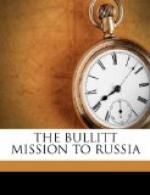The theaters, opera, and ballet are performing as in peace. Thousands of new schools have been opened in all parts of Russia and the Soviet Government seems to have done more for the education of the Russian people in a year and a half than czardom did in 50 years. (Appendix, p. 59.)
POLITICAL SITUATION
The Soviet form of government is firmly established. Perhaps the most striking fact in Russia today is the general support which is given the government by the people in spite of their starvation. Indeed, the people lay the blame for their distress wholly on the blockade and on the governments which maintain it. The Soviet form of government seems to have become to the Russian people the symbol of their revolution. Unquestionably it is a form of government which lends itself to gross abuse and tyranny but it meets the demand of the moment in Russia and it has acquired so great a hold on the imagination of the common people that the women are ready to starve and the young men to die for it.
The position of the communist party (formerly Bolsheviki) is also very strong. Blockade and intervention have caused the chief opposition parties, the right social revolutionaries and the menshiviki, to give temporary support to the communists. These opposition parties have both made formal statements against the blockade, intervention, and the support of antisoviet governments by the allied and associated governments. Their leaders, Volsky and Martov, are most vigorous in their demands for the immediate raising of the blockade and peace. (Appendix, p. 60.)
Indeed, the only ponderable opposition to the communists to-day comes from more radical parties—the left social revolutionaries and the anarchists. These parties, in published statements, call the communists, and particularly Lenin and Tchitcherin, “the paid bourgeois gendarmes of the Entente.” They attack the communists because the communists have encouraged scientists, engineers, and industrial experts of the bourgeois class to take important posts under the Soviet Government at high pay. They rage against the employment of bourgeois officers in the army and against the efforts of the communists to obtain peace. They demand the immediate massacre of all the bourgeoisie and an immediate declaration of war on all nonrevolutionary governments. They argue that the Entente Governments should be forced to intervene more deeply in Russia, asserting that such action would surely provoke the proletariat of all European countries to immediate revolution.




